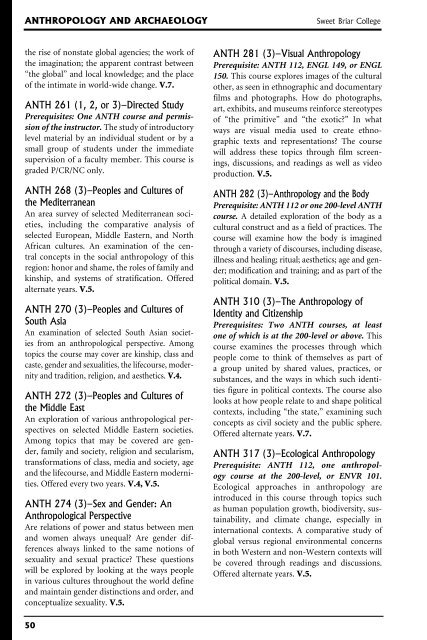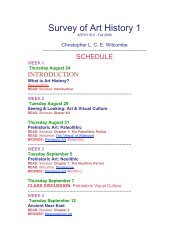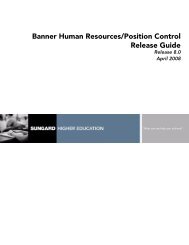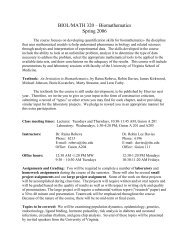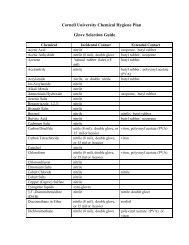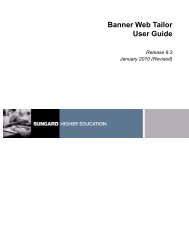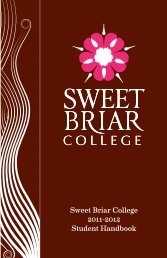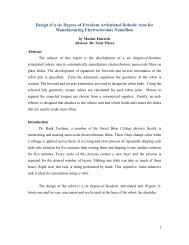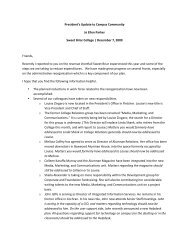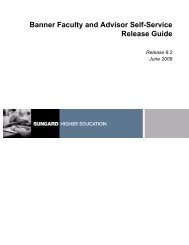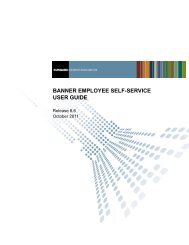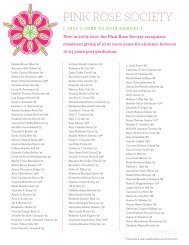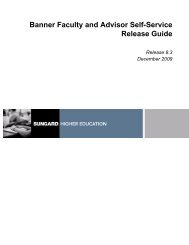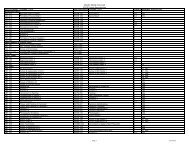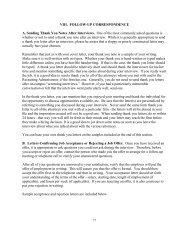Anthropology and Archaeology<strong>Sweet</strong> <strong>Briar</strong> <strong>College</strong>the rise of nonstate global agencies; the work ofthe imagination; the apparent contrast between“the global” and local knowledge; and the placeof the intimate in world-wide change. V.7.ANTH 261 (1, 2, or 3)–Directed StudyPrerequisites: One ANTH course and permissionof the instructor. The study of introductorylevel material by an individual student or by asmall group of students under the immediatesupervision of a faculty member. This course isgraded P/CR/NC only.ANTH 268 (3)–Peoples and Cultures ofthe MediterraneanAn area survey of selected Mediterranean societies,including the comparative analysis ofselected European, Middle Eastern, and NorthAfrican cultures. An examination of the centralconcepts in the social anthropology of thisregion: honor and shame, the roles of family andkinship, and systems of stratification. Offeredalternate years. V.5.ANTH 270 (3)–Peoples and Cultures ofSouth AsiaAn examination of selected South Asian societiesfrom an anthropological perspective. Amongtopics the course may cover are kinship, class andcaste, gender and sexualities, the lifecourse, modernityand tradition, religion, and aesthetics. V.4.ANTH 272 (3)–Peoples and Cultures ofthe Middle EastAn exploration of various anthropological perspectiveson selected Middle Eastern societies.Among topics that may be covered are gender,family and society, religion and secularism,transformations of class, media and society, ageand the lifecourse, and Middle Eastern modernities.Offered every two years. V.4, V.5.ANTH 274 (3)–Sex and Gender: AnAnthropological PerspectiveAre relations of power and status between menand women always unequal? Are gender differencesalways linked to the same notions ofsexuality and sexual practice? These questionswill be explored by looking at the ways peoplein various cultures throughout the world defineand maintain gender distinctions and order, andconceptualize sexuality. V.5.ANTH 281 (3)–Visual AnthropologyPrerequisite: ANTH 112, ENGL 149, or ENGL150. This course explores images of the culturalother, as seen in ethnographic and documentaryfilms and photographs. How do photographs,art, exhibits, and museums reinforce stereotypesof “the primitive” and “the exotic?” In whatways are visual media used to create ethnographictexts and representations? The coursewill address these topics through film screenings,discussions, and readings as well as videoproduction. V.5.ANTH 282 (3)–Anthropology and the BodyPrerequisite: ANTH 112 or one 200-level ANTHcourse. A detailed exploration of the body as acultural construct and as a field of practices. Thecourse will examine how the body is imaginedthrough a variety of discourses, including disease,illness and healing; ritual; aesthetics; age and gender;modification and training; and as part of thepolitical domain. V.5.ANTH 310 (3)–The Anthropology ofIdentity and CitizenshipPrerequisites: Two ANTH courses, at leastone of which is at the 200-level or above. Thiscourse examines the processes through whichpeople come to think of themselves as part ofa group united by shared values, practices, orsubstances, and the ways in which such identitiesfigure in political contexts. The course alsolooks at how people relate to and shape politicalcontexts, including “the state,” examining suchconcepts as civil society and the public sphere.Offered alternate years. V.7.ANTH 317 (3)–Ecological AnthropologyPrerequisite: ANTH 112, one anthropologycourse at the 200-level, or ENVR 101.Ecological approaches in anthropology areintroduced in this course through topics suchas human population growth, biodiversity, sustainability,and climate change, especially ininternational contexts. A comparative study ofglobal versus regional environmental concernsin both Western and non-Western contexts willbe covered through readings and discussions.Offered alternate years. V.5.50
<strong>2010</strong>-<strong>2011</strong> Catalog Anthropology and ArchaeologyANTH 325 (3)–Special Topics inAnthropologyPrerequisites: Two anthropology courses,including one at or above the 200-level. Anintensive study of a selected topic in anthropology,to be determined by the students and theinstructor.ANTH 328 (3)–Ritual and WorldviewPrerequisites: Two ANTH courses, at least oneof which is at the 200-level or above. A study ofhow ritual and religious symbolism define culturalcategories and individual experiences. Thecourse will focus on initiation and death ritual,taboo, witchcraft and other idioms of affliction,and some of the theories anthropologists haveused to interpret religious behavior and ideas.V.4, V.5.ANTH 334 (3)–Gifts and Commodities:The Construction of Value in Social LifePrerequisites: Two ANTH courses, at least oneof which is at the 200-level or above. How doobjects, such as gifts, money, commodities, artand aesthetic products, become “valued?” Howdo exchanges of valued objects shape relationshipsamong people? The place of value andexchange in everyday life is examined throughclassic statements (for example by Marx, Mauss,and Simmel), and also in selected ethnographies.Offered alternate years. III.O.ANTH 361 (1, 2, or 3)–Special StudyPrerequisites: Three anthropology courses,including one at the 200-level and permissionof the instructor. The study of an intermediatelevel topic by an individual student or by a smallgroup of students under the immediate supervisionof a faculty member. This course is taken ona P/CR/NC grading option only.ANTH 377 (1, 2, or 3)–InternshipPrerequisites: Three credits in ANTH and permissionof instructor, department chair, anddean. This course is graded P/CR/NC only.ANTH 451 (1)–Senior Workshop inAnthropology and ArchaeologyPrerequisites: Majors in anthropology orarchaeology. A fall term workshop for studentsplanning to take ANTH 452 in the spring term.In the course we will plan the senior seminar,and plan research projects for the spring, includingassembling bibliographies, and researchmaterials, and developing research proposalsfor review by the department. We also discusscareer planning and how the anthropology andarchaeology majors have prepared students for avariety of post-graduation paths. This course istaken on a P/CR/NC grading option only.ANTH 452 (3)–Senior SeminarPrerequisite: ANTH 451. An examination ofcore concepts and analytical methods in anthropologythrough focused discussion of contemporaryscholarship and through student seniorresearch projects. III.O, III.W.ANTH 461 (1, 2, or 3)–Independent StudyPrerequisites: Three ANTH courses, at leastone at the 300-level, and permission of theinstructor. Pursuit of an upper level researchproject determined in advance by the student inconsultation with a faculty member who will actas the sponsor. This course is taken on a P/CR/NC grading option only.Course Descriptions–ArchaeologyARCH 115 (3)–Archaeological MethodsPrerequisite: ANTH 114 or one course inARCH. An introduction to archaeologicalmethods and practices, including field surveyand excavation, background research, laboratoryconservation and analysis, preparing projectproposals, and knowledge of federal andstate regulations. Students are required to participatein some weekend activities. III.Q.ARCH 207 (3)–Rise and Fall of CivilizationsThis course focuses on the emergence of complexsocieties in the Old and New Worlds (suchas, the Mesopotamians, Egyptians, Harappans,Aztecs, Mayans, and Inkans). Topics include theorigins of agriculture and its effect on society,the shift from egalitarian societies to those withsocial ranking, the rise of cities, and the originsof writing. By highlighting the variability in preindustrialcivilizations, the course examines therole of cultural values in shaping the organizationof early societies. III.O, V.1.51
- Page 1: S w e e t B r i a r CollegeCatalog
- Page 6: A Brief HistorySweet Briar Collegei
- Page 14 and 15: academic scholarshipsVirginia resid
- Page 17 and 18: 2010-2011 Catalog student lifephysi
- Page 19 and 20: 2010-2011 Catalog student lifeColle
- Page 21 and 22: 2010-2011 Catalog college feesThis
- Page 24 and 25: general policiesSweet Briar College
- Page 26 and 27: general policiesSweet Briar College
- Page 28 and 29: academic programsSweet Briar Colleg
- Page 30 and 31: academic programsSweet Briar Colleg
- Page 32 and 33: academic programsSweet Briar Colleg
- Page 34 and 35: academic programsSweet Briar Colleg
- Page 36 and 37: academic regulationsAcademicRegulat
- Page 38 and 39: academic regulationsSweet Briar Col
- Page 40 and 41: equirements for the degreeSweet Bri
- Page 42 and 43: equirements for the degreeSweet Bri
- Page 44 and 45: equirements for the degreeSweet Bri
- Page 46 and 47: equirements for the degreeSweet Bri
- Page 48 and 49: Courses of instructionSweet Briar C
- Page 50 and 51: Anthropology and ArchaeologySweet B
- Page 54 and 55: Anthropology and ArchaeologySweet B
- Page 56 and 57: arts ManagementSweet Briar CollegeA
- Page 58 and 59: BiologyBiologyModern biology has ev
- Page 60 and 61: BiologySweet Briar CollegeBIOL 104
- Page 62 and 63: iologySweet Briar Collegeogy, anato
- Page 64 and 65: BusinessBusinessThe mission of the
- Page 66 and 67: BusinessSweet Briar Collegefunction
- Page 68 and 69: BusinessSweet Briar Collegeincludin
- Page 70 and 71: ChemistrySweet Briar Collegelaborat
- Page 72 and 73: chemistrySweet Briar CollegeCourse
- Page 74 and 75: chemistrySweet Briar CollegeCHEM 33
- Page 76 and 77: classics, philosophy, and religionS
- Page 78 and 79: classics, philosophy, and religionS
- Page 80 and 81: classics, philosophy, and religionS
- Page 82 and 83: classics, philosophy, and religionS
- Page 84 and 85: classics, philosophy, and religionS
- Page 86 and 87: classics, philosophy, and religionS
- Page 88 and 89: economicsSweet Briar CollegeECON 10
- Page 90 and 91: educationSweet Briar CollegeThrough
- Page 92 and 93: educationSweet Briar CollegeEDUC 22
- Page 94 and 95: englishSweet Briar Collegeable outc
- Page 96 and 97: englishSweet Briar Collegeare encou
- Page 98 and 99: englishSweet Briar CollegeStudents
- Page 100 and 101: englishSweet Briar CollegeENGL 110
- Page 102 and 103:
englishSweet Briar CollegeENGL 218
- Page 104 and 105:
englishSweet Briar Collegesized. Pl
- Page 106 and 107:
EnglishSweet Briar CollegeENGL 397
- Page 108 and 109:
EnglishSweet Briar Collegeand op-ed
- Page 110 and 111:
environmental studiesSweet Briar Co
- Page 112 and 113:
environmental studiesSweet Briar Co
- Page 114 and 115:
equine studiesSweet Briar CollegeEN
- Page 116 and 117:
gender studiesSweet Briar Collegeas
- Page 118 and 119:
government and international affair
- Page 120 and 121:
government and international affair
- Page 122 and 123:
government and international affair
- Page 124 and 125:
historySweet Briar Collegewhich cou
- Page 126 and 127:
historySweet Briar CollegeHIST 144
- Page 128 and 129:
historySweet Briar CollegeHIST 272
- Page 130 and 131:
HistorySweet Briar Collegears, and
- Page 132 and 133:
History of artSweet Briar Collegeth
- Page 134 and 135:
History of artart theory in the 15t
- Page 136 and 137:
honors programSweet Briar Collegeon
- Page 138 and 139:
Interdisciplinary studiesSweet Bria
- Page 140 and 141:
latin American studiesSweet Briar C
- Page 142 and 143:
law and societySweet Briar CollegeC
- Page 144 and 145:
Mathematical and computer sciencesS
- Page 146 and 147:
Mathematical and computer sciencesS
- Page 148 and 149:
mathematical economicsSweet Briar C
- Page 150 and 151:
modern languages and literaturesSwe
- Page 152 and 153:
modern languages and literaturesSwe
- Page 154 and 155:
modern languages and literaturesSwe
- Page 156 and 157:
modern languages and literaturesSwe
- Page 158 and 159:
modern languages and literaturesSwe
- Page 160 and 161:
modern languages and literaturesSwe
- Page 162 and 163:
modern languages and literaturesSwe
- Page 164 and 165:
musicSweet Briar CollegeCourse Desc
- Page 166 and 167:
musicSweet Briar CollegeMUSC 245 (1
- Page 168 and 169:
physical education, athletics, and
- Page 170 and 171:
physical education, athletics, and
- Page 172 and 173:
physics and engineeringSweet Briar
- Page 174 and 175:
physics and engineeringSweet Briar
- Page 176 and 177:
physics and engineeringSweet Briar
- Page 178 and 179:
physics and engineeringSweet Briar
- Page 180 and 181:
psychologySweet Briar CollegeThe Ps
- Page 182 and 183:
psychologySweet Briar CollegePSYC 3
- Page 184 and 185:
iding programReligionSee the Depart
- Page 186 and 187:
iding programSweet Briar CollegeRDP
- Page 188 and 189:
sociologySweet Briar CollegeNote: F
- Page 190 and 191:
sociologySOCI 450 (3)-Sociological
- Page 192 and 193:
studio artSweet Briar CollegeARTS 1
- Page 194 and 195:
studio artSweet Briar Collegetorica
- Page 196 and 197:
theatre and danceSweet Briar Colleg
- Page 198 and 199:
theatre and danceSweet Briar Colleg
- Page 200 and 201:
theatre and danceSweet Briar Colleg
- Page 202 and 203:
theatre and danceSweet Briar Colleg
- Page 204 and 205:
Academic honorsSweet Briar Collegeo
- Page 206 and 207:
Academic HonorsSweet Briar CollegeT
- Page 208 and 209:
facultySweet Briar CollegeGraduate
- Page 210 and 211:
FacultySweet Briar CollegeLinda S.
- Page 212 and 213:
FacultySweet Briar CollegeRebecca M
- Page 214 and 215:
FacultySweet Briar CollegeEmeritiGr
- Page 216 and 217:
Board of DirectorsSally Old Kitchin
- Page 218 and 219:
AdministrationSweet Briar CollegeOf
- Page 220 and 221:
indexSweet Briar CollegeFFaculty, 2
- Page 222 and 223:
Communications with the CollegeAdmi


